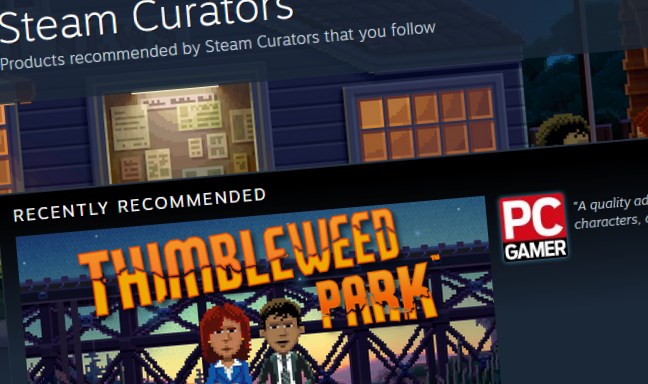Valve is revamping the way Steam recommends games
"Steam Explorers" will hopefully succeed where Greenlight did not.

Major changes are on the way to Steam that will, in theory at least, dramatically improve the quality of the discovery queue and the utility of the curation system. Based on a post-Valve-visit report by YouTube guy TotalBiscuit, the goal is to use a combination of data and more focused and effective curation to ensure that users only see games they'll be legitimately interested in, while effectively killing off bad games "by making them invisible."
TotalBiscuit said Valve believes that, for the most part, the system is actually working quite well, but it wants to ensure that people know why things are happening the way they are. The data used to drive the system will be available to everyone, which will enable a quicker and easier analysis (and, presumably, correction) of problems that result in "bad" games being displayed on user pages. But "they [also] want to be able to show that bad games are not actually clogging up the Steam store page," he said, and that despite how it may appear, that they're not getting any "real" attention. The ultimate goal is that "everybody's Steam page looks different but it's personalized perfectly to them, based on the data they have."
Probably the biggest front-facing change will be the addition of "Steam Explorers," an opt-in system in which users buy a game from a pre-selected list, then play and evaluate it based on various criteria. The games will have to be purchased, but Valve is considering "perks" for members of the program including unique badges, access to exclusive forums, and no-strings-attached refunds (one per week) which will make "explored" games not too terribly different from conventional review copies. The idea is apparently to come up with something more akin to what Valve originally had in mind for Steam Greenlight, but with more incentive for those taking part to approach it actively and seriously, thereby making it a more effective system for separating the wheat from the crapola.
Valve is also looking at changes to the Steam curators system to increase its functionality and "make curation a rewarding and useful experience." It wants to give curators the ability to put together "collections"—TotalBiscuit noted that he currently cannot create a list of his top ten games for 2016 and display it at the top of his curator's page, which by all rights should be a very simple and obvious thing for a curator to do—and is also looking at a level system for curators, with various unlockable perks.
Significant for developers is a plan for an integrated "key mailer system" that will enable studios to give games to Steam users without the need for Steam keys. That will presumably simplify the process of getting games into the right hands, but it will also help cut down on Steam key fraud.
None of this is carved in stone: As TB said in the opening of his video, "The stuff that we discussed and saw is in various states of either concept or development, meaning that we have no timeline on it, and of course we have no idea what the final form of any of this is going to be." Some of these ideas may be many months away from implementation, they may be changed in small or large ways, or they may not happen at all. But it's clear that something is going to happen, and with any luck at all we'll get a better store out of it—or at least a better idea of why the system works the way it does.
TotalBiscuit's full video, covering his visit in detail (it clocks in at a little over an hour, so lots of talking) is available below.
Keep up to date with the most important stories and the best deals, as picked by the PC Gamer team.

Andy has been gaming on PCs from the very beginning, starting as a youngster with text adventures and primitive action games on a cassette-based TRS80. From there he graduated to the glory days of Sierra Online adventures and Microprose sims, ran a local BBS, learned how to build PCs, and developed a longstanding love of RPGs, immersive sims, and shooters. He began writing videogame news in 2007 for The Escapist and somehow managed to avoid getting fired until 2014, when he joined the storied ranks of PC Gamer. He covers all aspects of the industry, from new game announcements and patch notes to legal disputes, Twitch beefs, esports, and Henry Cavill. Lots of Henry Cavill.


